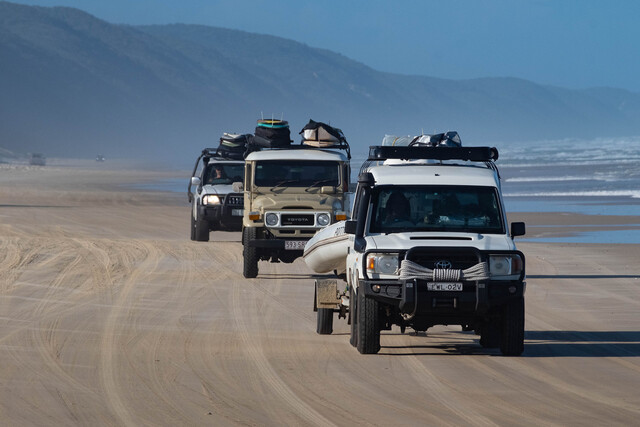The people who look after the parks, forests and recreational areas on the Cooloola Coast may soon be the same people to book you for driving offences.
This is the recommendation from a study undertaken by the Department of Environment, Science and Innovation for the sustainable use and management of the area.
The Cooloola study recommends the introduction of increased penalties to act as a better deterrent and in order to do this, they want to give rangers or authorised officers the ability to act in the same manner as the Queensland Police Service.
This means rangers can then give demerit points on licenses as well as fines for driving offences.
Legislative change and support from the government would be needed for this kind of measure, however, the study proposes this would have more impact than the current modest financial penalties alone.
Another option that they are considering is applying compliance measures to all visitors, such as double demerit points to driving offences on the beach.
Included in this section is the proposal to change the rules for “Direction to Leave“ provision where persons who had been directed to leave would be barred for 7 days or longer instead of the original 24 to 48 hours.
Also recommended in the study is to grant the ability to prohibit visitors or identified vehicles from visiting the area, meaning potential lifelong bans for identified offenders.
Technological solutions which support verifiable ID are remarked to be ideal to validate vehicle details and purchase of permits.
This comes as multiple potential new changes are coming to the Cooloola Coast, with recommendations for better management strategies and innovations such as a beach shuttle bus considered in a recently released study from the Department of Environmental, Science and Innovation.
The study was undertaken to consider sustainable visitor capacity and management of the area.
Recommendations were given for multiple sites along the Cooloola Coast such as Teewah Camping Zone, Freshwater Campsite and Rainbow Beach/lagoons precinct.
For Teewah Camping Zone, the focus is on campsite management, recommending further considerations on a campfire ban and positioning sale of campsites as per a site rather than per person.
For Freshwater Campsite, the recommendation is to look into how the area is marketed and find opportunities to redirect demand as a beach
alternative.
For the Rainbow Beach/lagoons precinct, the development of a zoning plan for the Double Island Point/ lagoon precinct is recommended whilst also factoring in motorised/ non-motorised zones with the aim to reduce conflict.
For overall and longer term considerations, the study suggests the potential introduction beach shuttle buses alike the Royal National Park bus service and ones used in United States National Parks.
Access to the area requires 4WD vehicles, which in significant part, is where environmental and resident amenity concerns stem from.
Also being considered is seasonal, or sectional closures to parts of the National Park and recreation area, access infrastructure permitting.
This is a common measure measure in national parks driven by issues such as nesting seasons, as well as providing a period for natural rejuvenation.









